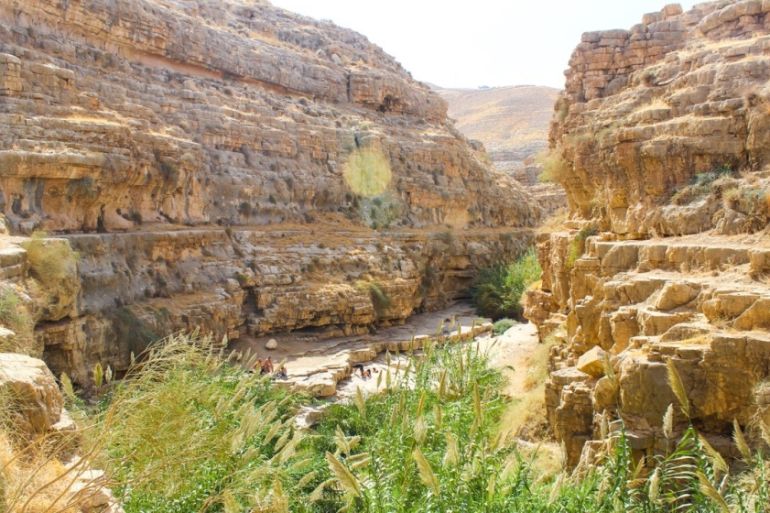A trip on Palestine’s social media bus
Initiative aims to bolster local and international awareness of Palestinian culture and heritage.

Ramallah – “Those who don’t know their country are incapable of loving it.” This was the motto for a recent project by Palestinian NGO Taghyeer for Social Media, which brought 50 bloggers, journalists and social media activists together on a bus trip to highlight the heritage of Palestine.
The trip started in the Palestinian Authority’s de facto capital of Ramallah and made stops at the Ein Fawwar and Ein Farah springs, the Nabi Musa shrine and the Sugar Mills in Jericho, a Palestinian city near the Jordan River with remains dating back more than 10,000 years.
Keep reading
list of 4 itemsThe Take: As missiles fly above, settler violence surges in the West Bank
Israeli settlers set fire to cars, homes of Palestinians under occupation
‘We’re on the edge’: Palestinians terrified by Israeli settler violence
Via smartphones, participants shared what they saw with tens of thousands of followers and friends on Facebook, Snapchat, Twitter and Instagram. The social media bus initiative generated huge interest in Palestine and abroad, Taghyeer founder Saed Karzoun told Al Jazeera, with more than 50,000 people following the hashtag #SMBUS on Twitter and Instagram in just two days.
As of 2014, less than half of Palestinians in the occupied territories had an internet connection, according to a recent report by 7amleh, the Arab Centre for Social Media Advancement. But the power of social media continues to grow.
“It’s the smart power that we use to connect with the world in seconds,” Karzoun said.
![Stops included the Sugar Mills in Jericho, a Palestinian city near the Jordan River with remains dating back more than 10,000 years [Jafar Zuabi/Al Jazeera]](/wp-content/uploads/2016/11/f2304320070a436b81ddd9fab282874f_18.jpeg)
According to a 2016 report published by the Palestinian company Concepts, approximately 1.7 million Palestinians in the occupied West Bank and the Gaza Strip use Facebook, while more than one million use WhatsApp and more than 300,000 use each of Twitter and Instagram.
Journalist and media researcher Tala Halawa noted that it is extremely important for Palestinians to maintain a presence on social media, as many people around the world use such platforms to interact with Palestinians and to learn about the country.
“The [social media bus] initiative takes advantage of Palestinians’ obsession with social media to increase awareness and promote these locations in Palestine,” Halawa added.
![The Nabi Musa shrine attracts pilgrims from all over the world [Jafar Zuabi/Al Jazeera]](/wp-content/uploads/2016/11/55bf4b97cda44329998a601bb6bec50e_18.jpeg)
Hamza Aqrabawi, a guide specialising in alternative forms of tourism, said that of the more than 1,000 tours he organised in 2016, the social media bus had the greatest impact.
“We realised that we have become strangers in our country. Israelis feel more comfortable because they know the land. It is extremely important to know Palestine to eliminate fear and claim ownership,” Aqrabawi told Al Jazeera.
“Every participant in the trip had at least 5,000 friends and followers. Thousands lived our experience. They all know Ein Farah and Ein Fawwar and are no longer afraid to go there.”
Participant Noor Hamad, a 34-year-old Palestinian who was born in Syria and grew up in Jordan, wrote about the trip and posted several photos online to share the experience with his friends. “When I saw the water coming from under the ground in Ein Fawwar, it quenched the thirst of 69 years under occupation,” Hamad said.
The participants not only live streamed, but also documented the journey for generations to come, Karzoun said, noting that “if you visit #SMBUS now, you will find extensive Arabic content about these four places. We are slowly building an archive about the Palestine we know.” After its initial success, two subsequent social media bus tours were organised in Nablus and Gaza.
There is still some way to go, however. Halawa said that the Palestinian narrative must still expand on larger English-language platforms, such as Wikipedia, in order to better combat the Israeli narrative.
A lack of 3G internet service in the occupied West Bank has posed a significant obstacle, forcing many Palestinians to rely on wi-fi, available only in specific areas.
“Israel tries to control Palestinians’ access to such services to keep them isolated from the world,” Halawa said.